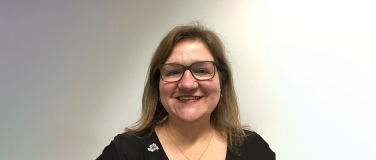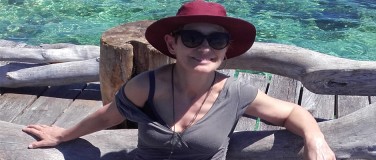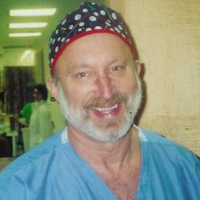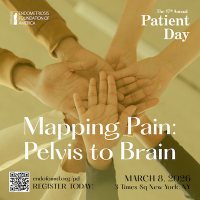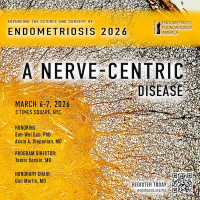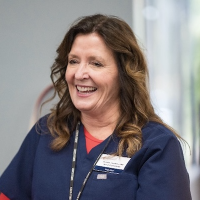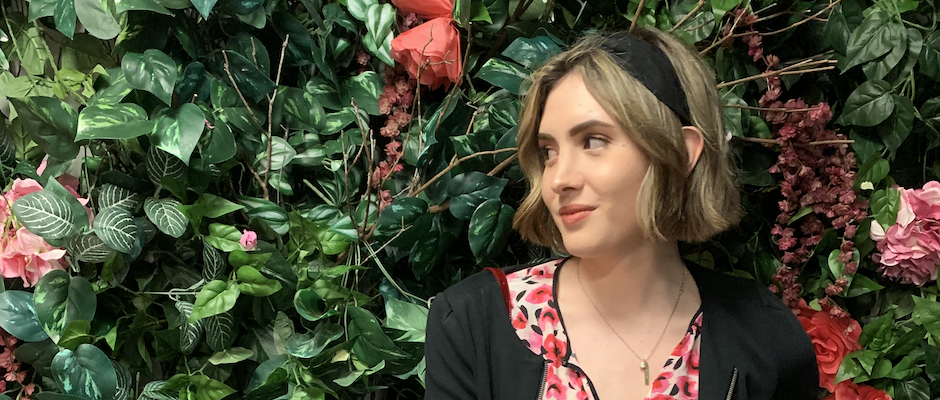
It all began when I was twelve years old. I was going through what every person was going through at my age: weird changes that were hard to explain or even cope with; that constant feeling of being gross ( you all know what I am talking about); not to mention, the emotional toll all of these changes had on us kids. We were all hormonal and for lack of a better word, assholes to each other.
One day, I remember I woke up feeling more different than I ever had before. I was bloated beyond belief and I felt horrible pain shooting from my belly button into my lower back. Standing was such a struggle, I even felt like my legs were going to fail and buckle underneath me at any minute. I thought to myself, “Oh, I’m going to die. This is it.” I was convinced I would be the one girl whose first period absolutely killed her. There was no way that the other girls in my grade were going through this as badly as I was.
Let’s fast forward a few years. I was eighteen, and in my senior year of high school. I was a very motivated and driven student, deciding where I wanted to go to college and enjoying the last months I had with my friends before we went our separate ways. Life was good, but the pain that I woke up with when I was twelve was still a blaze deep inside me.
There was one night that fall when I came home from school and could barely keep my pants buttoned. I had bloated so much that I looked like I was seven months pregnant. It was mortifying. I curled up in bed and sobbed until my mom came home to find me. I was shaking and crying. It felt as if someone was turning a knife slowly into my right side of my abdomen. “There is something so wrong, Mom,” I told her. “I feel like something is going to pop. I’m so scared.”
Late that night, it was just my mom and me inside an all-white, brightly-lit ER room with no décor save for a single cross above my bed. I had wished I believed in a higher power at that moment, but I don’t even think Jesus would have helped me. I was tangled in a dingy white blanket and ugly hospital gown, and I just wanted to go home and be in bed with my heating pad. My mom kept trying to crack jokes to make me feel better—she’s always been a huge support during this ordeal. After a CT scan and uncomfortable ultrasound, the doctors came to tell me, “we found what was an ovarian cyst, but it has ruptured and there’s fluid in your pelvic region. You’re fine.” Little did I know that for the next few years, I would get similar diagnoses from many ER doctors who all ended up saying the same thing: “You’re fine.”
I wanted so badly to believe these doctors. I wanted nothing more than to say, “I just get bad periods, and sometimes a cyst.” But it’s more than just that. I was dealing with something that was affecting me physically and emotionally, making me feel sick but not look sick, and affecting every aspect of my life.
This past February, I experienced what I would never wish upon anyone, but ended up being a step in the right direction.I went to visit some people back in Boston for a weekend. I was so excited to have a great weekend with some amazing people. And it was a great time—until the morning I had to leave. I woke up that Sunday morning to that familiar feeling again. My lower back was on fire, I couldn’t stop bleeding, and my lower legs were insanely sore. I was trying to get through the day and enjoy my last few hours in Boston, but something was so wrong.
My flight was at 6 pm, and by then I was completely drained. Looking in the mirror of the dimly lit, freezing cold bathroom, I could see my eyes were sunken in and my skin looked gray. I was dreading getting on the plane for that thirty-five minute flight back to New York. It felt as if I had a UTI, and I instantly thought it was in my kidneys since I was bleeding so hard. When we landed, I took a cab right to the hospital and checked in. I basically passed out the second I walked through the sliding doors and started sobbing uncontrollably. Laying in the hospital bed, I just wanted it to be over. I wanted the doctor to stop the bleeding, to give me all the pain meds to make me feel somewhat human, and I just wanted to feel normal.
The doctor came in after yet another CT scan, yet another ultrasound, and yet another routine exam. She said she had never seen someone bleed so much with their cycle. I said, “I’m not on my cycle, this just happened.” She looked at me like I was an idiot. “I think you’re wrong, and not tracking your cycle.” I was shocked. She told me with a straight face that I did not know my own damn body.
She said, “We can’t do much for you. Here is some Percocet, take it as needed and hopefully the bleeding will stop soon. You’re fine.” I left shortly after that, feeling dejected, drugged up, and more alone than I ever have felt in my life. I knew at this point, I had to do something.
I met with my general practitioner and discussed everything that I had been going through since I was twelve years old. I could tell that she cared while she jotted down symptom after symptom in my file. She referred me to an OBGYN who has been known to specialize in gynecologic and reproductive conditions. I was elated. I felt as if someone finally saw me and my pain for what it was. I was so ready to go see this doctor and I didn’t think that this doctor would end up being more disappointing than the rest of the ER doctors.
After my first appointment, which was filled with tears and stress, I was told that I needed to have an IUD put in. I thought, ok well, she may know what she’s talking about and this could very well be exactly what I need. I was very nervous, but wanted to try anything to alleviate the pain I was experiencing. What I didn’t know is that this was only the beginning of my pain.
Having the IUD inserted was one of the most traumatic experiences of my life. The doctor struggled for thirty minutes to place the device and I was on the verge of passing out. I was screaming in pain, crying, and trying to keep myself conscious while the doctor was telling me to “just relax” while it felt like my insides were being pulled and twisted. I never would have done this had I known the intense pain I had to endure for those thirty minutes, and for the next few months.
As summer went by, I was having constant complications with this device. I will admit, it helped with clearing my skin and hormone balancing, but otherwise I was still dealing with insane amounts of pain that affected my professional, social, and love life. It made me want to hole up in my apartment and never want to speak to anyone. I didn’t look sick, so who was going to believe me?
I finally had had enough after my worst night ever. I woke up shaking and covered in cold sweat at 2 am . I was bleeding for absolutely no reason, with the intense, sharp pain digging into my side. It felt like someone was attempting to cut out my insides. I managed to clean up, change my sheets, and sleep for a bit after I took a pain medication, but I needed medical attention.
I got myself to the ER and was seen almost immediately. This doctor was more understanding than all the others. I told her my symptoms, how no one seemed to listen to me before, and just how scared I was. She treated me with care and compassion—more than I had ever been shown before. After extensive tests and exams, she came back and explained to me that I had a cyst the size of a golf ball sitting on my ovary. I was almost sick at the thought of it; how could something that big be growing on something that isn’t even that large in the first place?!
She discussed that we had to wait for the cyst to go away on its own while watching out for complications, and instead of saying, “You’re fine,” she sat with me. She discussed how concerned she was about my symptoms, and how I should be referred to a specialist. She said I sounded very much like patients she has seen before who struggle with endometriosis. For those who don’t know, endometriosis is a condition that causes lining similar to the endometrium to grow outside the uterus and cause lesions in the organs surrounding the uterus. Though I was scared, I was happy someone listened and was helping to point me in the right direction.
I was ready for this to be over. I needed answers. I needed a solution. I called three doctors I was referred to, who told me they either were no longer taking new patients or that my case wasn’t dire enough for them (an assessment they made without even seeing me). But I refused to give up. I did extensive research, and after staying up almost all night, I found a doctor whose specialty is endometriosis. I called first thing in the morning and was given an appointment a month later.
Walking into that appointment, I had so many questions I wanted answered and was ready to speak up for myself. I was seen by one doctor first who had me list out all my symptoms and problems. A page and a half later, she prepped me for an ultrasound that was done by the specialist himself. They all had a very warm bedside manner, and I was very pleased by that. Then, I sat in an office with them and they told me what they found.
Turns out, my uterus is tilted pretty much at an exact 90 degree angle. It is so badly tilted, it’s pressing down on organs around it, causing many complications. I also have a heart-shaped uterus, and while it sounds cute, it isn’t cute at all. It is causing issues with bleeding and eventually, will cause issues with fertility. Worst one of all though, is that the IUD that was pushed on me so many times and caused me physical and mental trauma, was actually puncturing my uterine wall and sitting in the wrong place, causing issue after issue. I was shocked by all the information I was receiving, but also relieved that someone actually looked and someone actually cared. “So, what’s next?” I asked, clenching the tissues in my hand. The doctor said, “We are going to need to operate to give you a better quality of life. We have to see exactly what is going on inside your body, and try to reconstruct your uterus.”
I closed my eyes for a second and let the tears flow down my face. They were tears of joy, but also tears of absolute pure fear. I didn’t want to do this, but I also knew I needed to. Not once did this surgeon question me or doubt me. He and his team also never ever pushed me to do this operation. They reminded me it is 100% elective, but it could also be the answer to all the problems I have been having. So, I decided that is exactly what I would do. I would let the doctors open me up and find the cause of what has been a constant affliction in my life since I was a young girl.
Now here we are: I’m sitting in my apartment, looking down at the little scars on my belly one week post op. The surgery itself, which was supposed to be an hour and a half, ended up being four and a half hours. The surgeons saw adhesions everywhere, from my ovaries to my intestines and lungs. What was even more terrifying is that they saw my appendix, or what was left of it. It was shriveled up and diseased, folded over and drooping on my right ovary. They were shocked that no doctor had pointed this out to me during my many trips to ERs and doctor’s offices, after endless CT scans and ultrasounds. They said I had probably been having multiple episodes of appendicitis throughout the years and couldn’t believe it hadn’t burst yet. In the end, they were shocked no one could hear my cry for help.
I woke up from surgery in agony. Confused and crying, I had an insanely low blood pressure and pulse. I wasn’t in great shape, but hours of full anesthesia will do that to you. They kept me over night and immobilized so my ovaries could sit suspended for the night and heal. The weirdest part was seeing these little ties on either side of my inflated stomach that were essentially holding me together. I left the next morning, ready to take my bloated self home and start this new life without pain. I can happily say now, one week post op, I feel better than I have since I was twelve (with the exception of some residual surgical bloating). I cannot wait to see what comes next.
So, you may be asking, “why the hell is she writing this?” I am writing this for the woman who is like me. The woman who has missed school, work, or events because of her period. For the woman who doesn’t understand why it hurts when she’s in an intimate situation with her significant other. For the woman who can’t seem to get pregnant. For the woman who feels unheard or unseen. You are absolutely 100% important. What is happening to you is happening to many other women.
We, as women, need to stand up and fight for our right to be seen. For doctors to listen to us, and to be persistent when they try to shut us down. Endometriosis, while not a death sentence, is a sentence to a life in pain, a life with struggles, and a life we don’t deserve. All I want from sharing my story is for the women who are experiencing these same or similar symptoms to not feel alone and to have the confidence to get the answers and the help that they very well deserve.
Eileen Hedger is 23 years old from Seattle, Washington living in Brooklyn, NY and is a student at the Fashion Institute of Technology. She was diagnosed with Endometriosis in October of 2019, but has struggled with the disease since she was 12.
Editor's note: Would you like to contribute to EndoStories? Click here to learn how to submit your work.
*Patient stories submitted to EndoFound.org are the views of the patient and not necessarily those of the foundation. All testimonials are from real patients, and may not reflect the typical patient’s experience, and are not intended to represent or guarantee that anyone will achieve the same or similar results.



